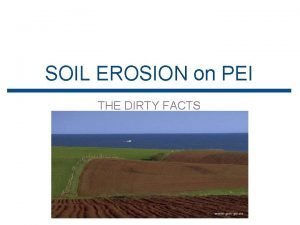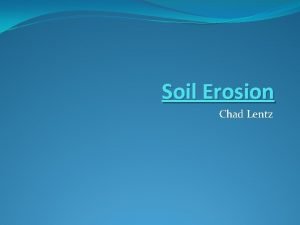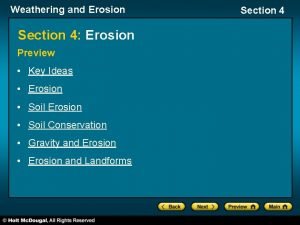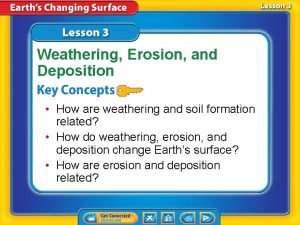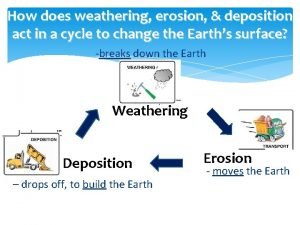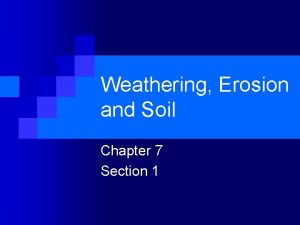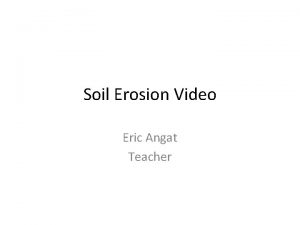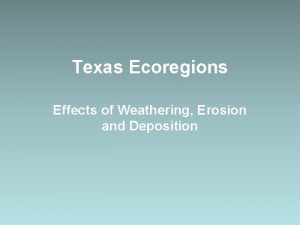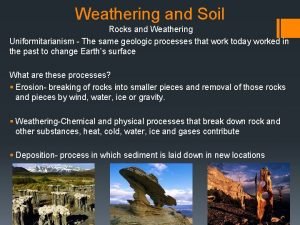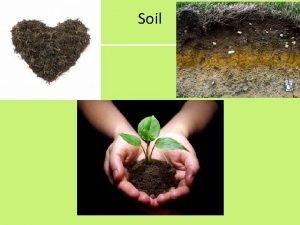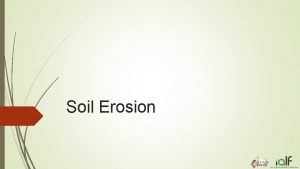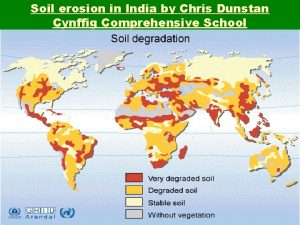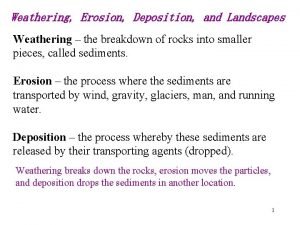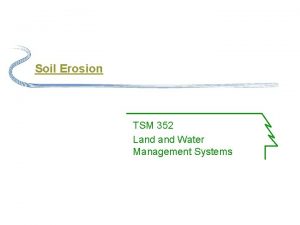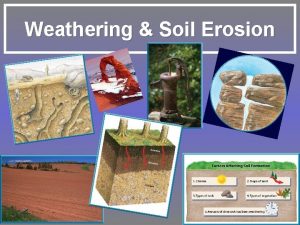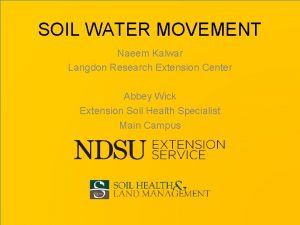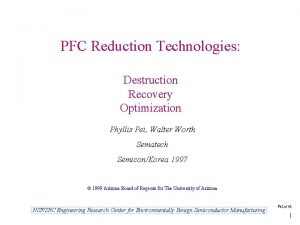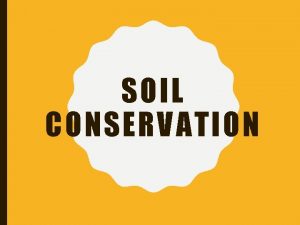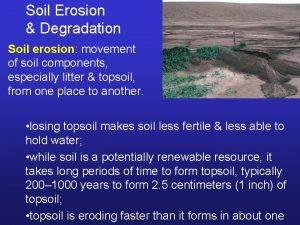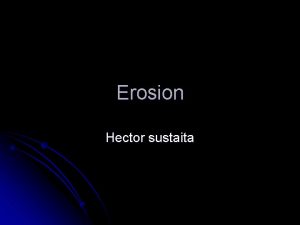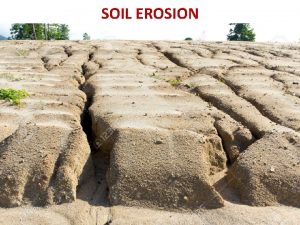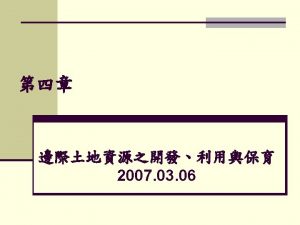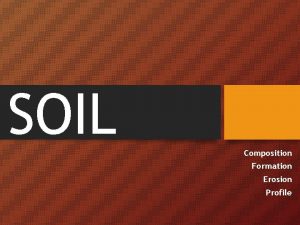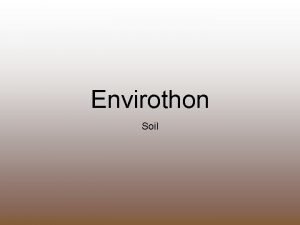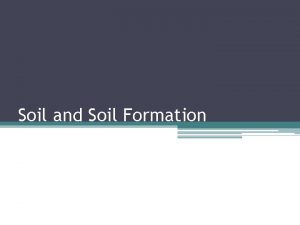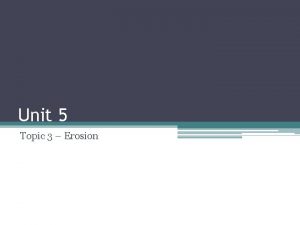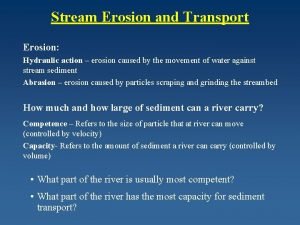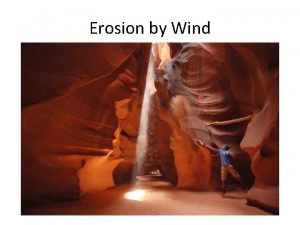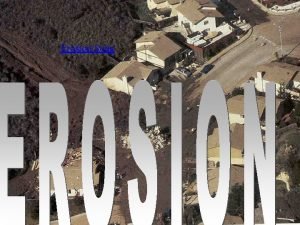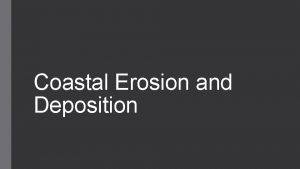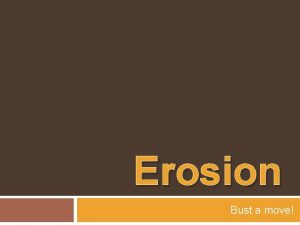SOIL EROSION on PEI THE DIRTY FACTS WHAT
































- Slides: 32

SOIL EROSION on PEI THE DIRTY FACTS

WHAT IS SOIL EROSION ▪ Soil Erosion is. . ▸ The process of soil particles being carried away by the natural processes of wind and water.

TOPSOIL TIDBITS ▪ Soil formation on PEI can take up to 300 to 500 years to create 1 inch of soil under natural conditions. ▪ Good agricultural land has 6 -8 inches of topsoil, after this, “B” layer of poorer material. ▪ http: //www. youtube. com/watch? v=Ch. EHQUMEk. Xw

EROSION RATES ▪ Erosion by water is a naturally occurring process and should remain less than the rate of new soil formation under undisturbed conditions. ▪ A tolerable soil loss rate should not exceed 7. 0 tonnes/ha (3 tons/acre). ▪ Erosion is site specific and the two biggest factors are the length and degree of slope.

TOPSOIL LOSS ▪ The average rate of soil loss on PEI is 10 to 15 tonnes per acre per year. ▪ Some fields lose up to 20 tonnes/year/acre. ▪ This means that in 8 years, one inch of valuable topsoil is lost.

EROSION ? HOW COME? Factors that contribute to soil loss on PEI

FACTORS AFFECTING SOIL EROSION CLIMATE ▪ Erosion closely linked to rainfall intensity, duration and distribution. ▪ Cycles of freezing and thawing has a major affect with the top 20 -55 mm thawing and below it still frozen. ▪ Up to 80% of annual erosion can occur this way. ▪ Wind erosion occurs when soil is dry and recently loosened as in the spring cropping season or. . . ▪ During the winter when fields are exposed due to a lack of snow or cover.

FACTORS AFFECTING SOIL EROSION ERODIBILITY ▪ Two major factors in a soils potential to erode are ▸ Organic matter content – The soils abality to absorb water, hold water and remain stable are largely dependent on the types and amounts of organic material. ▸ Particle size – Soil high in silts and clay loams are very erodible as they permit the rain to penetrate slowly increasing run-off.

FACTORS AFFECTING SOIL EROSION TOPOGRAPHY ▪ Slope and steepness directly affect erosion rates.

FACTORS AFFECTING SOIL EROSION TOPOGRAPHY ▪ It is estimated that on PEI 100, 000 acres of farmed land is very susceptiblile to erosion due to the topography. ▪ If the slope is doubled the soil loss is increased 1. 5 times ▪ If the steepness is doubled the soil loss is increased 2. 5 times

FACTORS AFFECTING SOIL EROSION VEGETATIVE COVER ▪ Erosion is decreased when soil has permanent cover or crop residue left on it.

FACTORS AFFECTING SOIL EROSION CULTURAL PRACTISES ▪ PEI’s main sources of silt and erosion are from: http: //www. youtube. com/watch? v=DRu-3 Lkz. Jx 0 ▸ Agriculture ▸ Forestry ▸ Highway Construction and Maintenance

TYPES OF EROSION

TYPES OF SOIL EROSION WIND EROSION ▪ This type of erosion is caused by high winds over dry or frozen unprotected soil. ▪ It is a problem for PEI due to the prevailing constant winds ▪ Increased by excessive tilling, failing to leave crop residue or removing hedgerows or windbreaks

TYPES OF SOIL EROSION SPLASH EROSION ▪ Caused by raindrops falling on soil particles that detach and then carry them off the field ▪ One raindrop can be so explosive it can hurl a particle 3 meters high and more than 3 meters away

TYPES OF SOIL EROSION SHEET EROSION ▪ Thin sheets of soil are removed as water moves over the soil surface ▪ One of the greatest sources of topsoil loss ▪ Difficult to see as it removes soil equally over the field

TYPES OF SOIL EROSION RILL EROSION ▪ Seen as many small narrow ditches cut into the surface. ▪ This is another major source of topsoil loss ▪ Trenches are usually less than 1 foot deep but may be many across a field

TYPES OF SOIL EROSION GULLY EROSION ▪ Large gullies cut of the field. ▪ It is the most visible type but actually represents less total soil loss than sheet or rill. ▪ Trenches are more than 1 foot deep

TYPES OF SOIL EROSION STREAMBANK EROSION ▪ Streambank erosion can occur both at agricultural and non-agricultural areas ▪ It is compounded by having livestock in the stream. ▪ Trampled vegetation exposes soil to erosion increasing silt in the stream ▪ Bacterial contamination and increased nutrient levels also occur due to livestock access.

EFFECTS OF SOIL EROSION IN STREAMS ▪ When silt is deposited in the stream from poor cultural practices the water becomes too shallow from the build up of silt. ▪ This results in water warming up quickly making it inhospitable to fish species ▪ Sometimes it is so bad, only a small trickle remains reducing the amount available to fish ▪ Increased silt levels also cover spawning areas suffocating eggs or fry that have hatched.


Erosion, combined with sea levels rising, with turn PEI into PEI’s

HOW DO WE CLEAN UP THIS MESS? CONSERVATION METHODS TO REDUCE SOIL EROSION

CONSERVATION PRACTICES CROPPING SYSTEMS ▪ Winter/Cover crops - planting crops early in the fall to hold the soil together through a developed root system. If too late, covering the crop with mulched straw. ▪ Cross-slope farming - ploughing and planting fields with a gentle slope across the slope rather than with the slope.

CONSERVATION PRACTICES CROPPING SYSTEMS ▪ Crop rotations - new legislation now regulates the rotation of crops; row, forage and grain into a three year rotation ▪ Strip cropping - used on gentle slopes alternating the three crops row, grain and forage never planting row crops last in the field

CONSERVATION PRACTICES STRUCTURAL CONTROLS ▪ Grassed waterways - broad, shallow channels planted with grasses to help slow the speed of water and trap sediments before they leave the field.

CONSERVATION PRACTICES STRUCTURAL CONTROLS ▪ Diversion terraces - are used –where the slope length of a field is greater than the accepted limit for cross slope farming or strip cropping. –Terraces break up long slopes into a series of shorter ones. – Diversion terraces will transport substantial amounts of runoff and must be permanently vegetated.

CONSERVATION PRACTICES STRUCTURAL CONTROLS ▪ Hedgerows - are treed windbreaks that protect fields from wind erosion. ▸ They control soil erosion by reducing wind speed at ground level and by trapping snow, leaving soil less exposed during the winter months. ▪ Buffer Strips - refers to a permanent vegetated zone bordering streams, ponds and estuaries that serve to filter sediments leaving the field. ▸ Generally should be 20 -30 meters but depend on the slope of the field and cover crop.

New Orleans is Sinking • http: //www. cbsnews. com/2100 -18560_162 -1056304. html • http: //www. youtube. com/watch? v=LAZUs. CONj. IQ

New Orleans was built at the bottom of the Mississippi River Delta. Problem # 1 The river is full of sediment which is deposited on the river bottom and also at the mouth of the river (forming a delta). This deposition also raises the level of the river each year. New Orleans is a bustling big city, that can not just raise it’s height. Every year the river increases in height, and the city decreases as it’s been built on a bog. Problem #2 As the Mississippi has been dammed many times, not nearly as much sediment reaches the Gulf of Mexico. This is causing the outer reaches of the delta to not have more sediment replenishing wind and wave erosion. Thus much of the outer delta and islands are disappearing.

The city has had to build levee’s in order to hold the water back. The problem though is the water height increases each year and the city sinks each year. Many people in the outlying areas (outside the city walls) build their home on stilts (to be ready for the flooding each spring)

Hurricane Katrina was a Category 5 Hurricane that flooded the city, killed 1800 people and caused over $81 billion dollars in damage. 80% of the city was flooded. As the city is below sea level, the water had to be pumped out. The water flooded the city for over 3 weeks. Much of the city has never been rebuilt, as the homeowners are too scared to rebuild. Over 150, 000 people left the city after the hurricane (out of a population of 500, 000)
 Factors affecting soil erosion
Factors affecting soil erosion Control measures of soil erosion slideshare
Control measures of soil erosion slideshare Detachment in soil erosion
Detachment in soil erosion Opera refers to a dramatic art form
Opera refers to a dramatic art form Weathering and soil erosion
Weathering and soil erosion Weathering and soil erosion
Weathering and soil erosion Type of erosion
Type of erosion Geology deposition
Geology deposition Chapter 7 weathering erosion and soil
Chapter 7 weathering erosion and soil Soil erosion video
Soil erosion video Oak woods and prairies weathering
Oak woods and prairies weathering Weathering and soil erosion
Weathering and soil erosion Type of soils
Type of soils Soil erosion def
Soil erosion def Soil erosion in india
Soil erosion in india Weathering vs erosion vs deposition
Weathering vs erosion vs deposition Soil erosion
Soil erosion The rate of weathering depends upon the area's ____
The rate of weathering depends upon the area's ____ Soil erosion caused by human activities
Soil erosion caused by human activities Living soil vs dead soil
Living soil vs dead soil Convergent plate boundaries
Convergent plate boundaries Permanent wilting point
Permanent wilting point 64:8+9:9-63:7
64:8+9:9-63:7 Pei internet
Pei internet Kei+pei=kef+pef refers to
Kei+pei=kef+pef refers to Obiettivi pei per aree
Obiettivi pei per aree Plano de nivelamento de aprendizagem
Plano de nivelamento de aprendizagem My blue print tcdsb
My blue print tcdsb Pei tong primary school address
Pei tong primary school address Jacqueline pei
Jacqueline pei Ieoh ming pei philosophy
Ieoh ming pei philosophy Phyllis pei
Phyllis pei La pei zrenjanin
La pei zrenjanin
